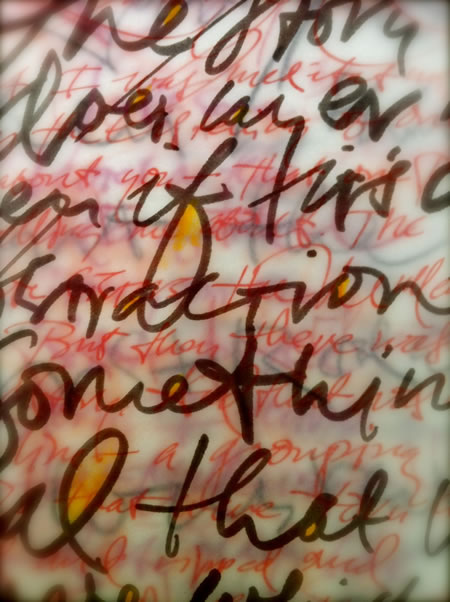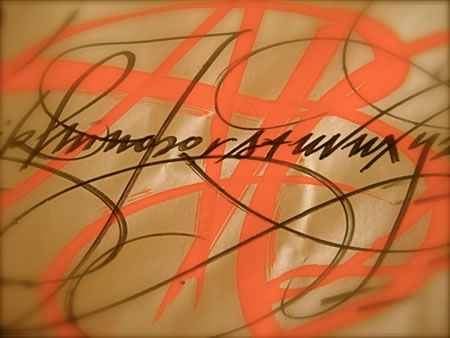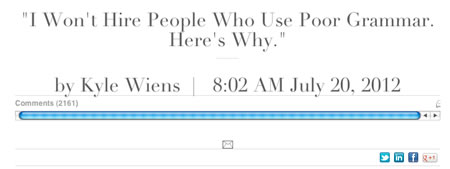Handwriting, the message, and the carriage of content

I can look at a person’s handwriting and know how it will work out [their relationship to me.]

There are insights in the cartography of writing [handwriting as soul-mapping] — and these interplays: [the mind, the eyes, the arm, the wrist, fingers and fingertips] that tells a story that is always worth studying.
There is the obvious movement on the surface — and then the underplays of energy — the flow — deeply entwined details that can be found within, and beneath.
Anytime that I can, I watch how people write, how they hold their writing tools, how they pay attention — and finally, what their writing looks like.




I can sense how I’m feeling in my own handwriting — whether flow, intention, focus are there, or not.
I would reckon that the same principles shall apply to the clarity and focus of actual writing, how these strings of thoughts are arranged — ideas are transcribed.

Content, the thinking of a person — and how writing is organized and reflected in expression — is similarly telling.
Great writing — well executed — can win hearts, minds, wars and magnetize millions.
And then, there’s this little essay below, [can you find the grammatical errors?] boosted from HBR:

If you think an apostrophe was one of the 12 disciples of Jesus, you will never work for me. If you think a semicolon is a regular colon with an identity crisis, I will not hire you. If you scatter commas into a sentence with all the discrimination of a shotgun, you might make it to the foyer before we politely escort you from the building.
Some might call my approach to grammar extreme, but I prefer Lynne Truss’s more cuddly phraseology: I am a grammar “stickler.” And, like Truss — author of Eats, Shoots & Leaves — I have a “zero tolerance approach” to grammar mistakes that make people look stupid.
Now, Truss and I disagree on what it means to have “zero tolerance.” She thinks that people who mix up their itses “deserve to be struck by lightning, hacked up on the spot and buried in an unmarked grave,” while I just think they deserve to be passed over for a job — even if they are otherwise qualified for the position.
Everyone who applies for a position at either of my companies, iFixit or Dozuki, takes a mandatory grammar test. Extenuating circumstances aside (dyslexia, English language learners, etc.), if job hopefuls can’t distinguish between “to” and “too,” their applications go into the bin.
Of course, we write for a living. iFixit.com is the world’s largest online repair manual, and Dozuki helps companies write their own technical documentation, like paperless work instructions and step-by-step user manuals. So, it makes sense that we’ve made a preemptive strike against groan-worthy grammar errors.
But grammar is relevant for all companies. Yes, language is constantly changing, but that doesn’t make grammar unimportant. Good grammar is credibility, especially on the internet. In blog posts, on Facebook statuses, in e-mails, and on company websites, your words are all you have. They are a projection of you in your physical absence. And, for better or worse, people judge you if you can’t tell the difference between their, there, and they’re.
Good grammar makes good business sense — and not just when it comes to hiring writers. Writing isn’t in the official job description of most people in our office. Still, we give our grammar test to everybody, including our salespeople, our operations staff, and our programmers.
On the face of it, my zero tolerance approach to grammar errors might seem a little unfair. After all, grammar has nothing to do with job performance, or creativity, or intelligence, right?
Wrong. If it takes someone more than 20 years to notice how to properly use “it’s,” then that’s not a learning curve I’m comfortable with. So, even in this hyper-competitive market, I will pass on a great programmer who cannot write.
Grammar signifies more than just a person’s ability to remember high school English. I’ve found that people who make fewer mistakes on a grammar test also make fewer mistakes when they are doing something completely unrelated to writing — like stocking shelves or labeling parts.
In the same vein, programmers who pay attention to how they construct written language also tend to pay a lot more attention to how they code. You see, at its core, code is prose. Great programmers are more than just code monkeys; according to Stanford programming legend Donald Knuth they are “essayists who work with traditional aesthetic and literary forms.” The point: programming should be easily understood by real human beings — not just computers.
And just like good writing and good grammar, when it comes to programming, the devil’s in the details. In fact, when it comes to my whole business, details are everything.
I hire people who care about those details. Applicants who don’t think writing is important are likely to think lots of other (important) things also aren’t important. And I guarantee that even if other companies aren’t issuing grammar tests, they pay attention to sloppy mistakes on résumés. After all, sloppy is as sloppy does. Clearly, there are many telling points to the mapping and revelation of personality — to each, their own. Judgement, one would presume, would never be founded on a teasing test of one skill alone, given the spherical richness of humanity. I could, like the author above, never suggest that poor spelling or grammar would be the grounds for disconnection — but interestingly, surprisingly poor spelling thrives in the richest of minds. Clumsy grammar could be pointed as an attribute to thousands of powerful writers. Creativity can flourish in the enthusiasm of language — and the flowering of personal structures
That’s why I grammar test people who walk in the door looking for a job. Grammar is my litmus test. All applicants say they’re detail-oriented; I just make my employees prove it.
[[Editors’ note: If you’re interested in improving your writing skills, please consider our Guide to Better Business Writing book]]
TSG
…..
G I R V I N | THE MESSAGE IS THE VOICE
DESIGNED TEXTUAL CONTENT: THE BREATH OF SOULBRAND
http://bit.ly/sJ4IjO